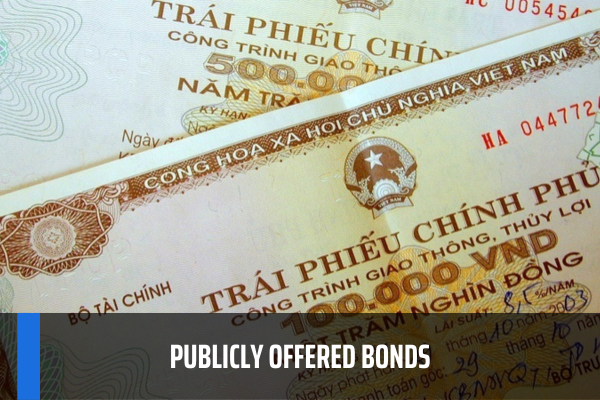What are bonds? How much is the face value of a publicly offered bond in Vietnam?
Vietnam: What are bonds?
According to the Law on Securities 2019, “securities” include the following assets:
- Shares, bonds, fund certificates;
- Warrants, secured warrants, pull options, depository receipts;
- Derivatives;
- Other kinds of securities defined by the Government.
Pursuant to Clause 6, Article 3, Decree 155/2020/ND-CP explains bonds as follows:
Definitions
For the purpose of this Decree, the terms below are construed as follows:
...
6. “bonds” are a kind of securities that have a duration of at least 01 year and are issued by enterprises to certify lawful rights and interests of their holders to part of the issuers.
According to regulations, “bonds” are a kind of securities that have a duration of at least 01 year and are issued by enterprises to certify lawful rights and interests of their holders to part of the issuers.

What are bonds? How much is the face value of a publicly offered bond in Vietnam? (Image from the Internet)
How much is the face value of a publicly offered bond in Vietnam?
Pursuant to the provisions of Article 13 of the Law on Securities 2019, there is content on securities par value, including bond par value, as follows:
Face values of securities
1. Face values of securities offered within Vietnam’s territory shall be expressed as VND.
2. The face value of a publicly offered share or fund certificate shall be 10 thousands VND. The face value of a publicly offered bond shall be a multiple of 100 thousands VND.
3. In case the securities price of an issuer on the securities trading system is lower than the face value, the issuer may offer the securities at that lower price.
Thus, the face value of a publicly offered bond shall be a multiple of 100 thousands VND.
What are the conditions for making public offering of bonds in Vietnam?
Pursuant to Clause 3, Article 15 of the Law on Securities 2019 and Article 19 of Decree 155/2020/ND-CP, conditions for making public offering of bonds include:
- The contributed charter capital is at least 30 billion VND on the offering date according to the accounting books;
- The issuer has profit in the preceding year and has no accumulated loss on the offering date; there is no debt that is overdue for more than 01 year;
- There is a plan for issuance, use and repayment of the capital generated by the offering ratified by the General Meeting of Shareholders, Board of Directors, the Board of members or the company president;
- The issuer has a commitment to fulfill its obligations to the investors in terms of conditions for issuance, payment, assurance of the lawful rights and interests of investors and other conditions;
- The offering is consulted by a securities company, unless the issuer is already a securities company;
- The issuer is not undergoing criminal prosecution and does not have any unspent conviction for economic crimes;
- The issuer has a credit rating if required by the Government
- The issuer or offered bonds are rated by a credit rating organization that is granted the certificate of eligibility by the Ministry of Finance in the following cases:
+ The total value of bonds at their face value raised in every 12 months exceed 500 billion VND and exceed 50% of the equity according the latest annual financial statement that is audited (or examined half-year financial statement if the issuer is required to disclose the examined half-year financial statement) by an accredited audit organization; or
+ The bond outstanding at face value on the offering registration date exceed 100% of the equity according the latest annual financial statement that is audited (or examined half-year financial statement if the issuer is required to disclose the examined half-year financial statement) by an accredited audit organization
- The issuer has an escrow account to receive payments for the offered bonds;
- The issuer has a commitment to have its shares listed on the securities trading system after the end of the offering.
LawNet